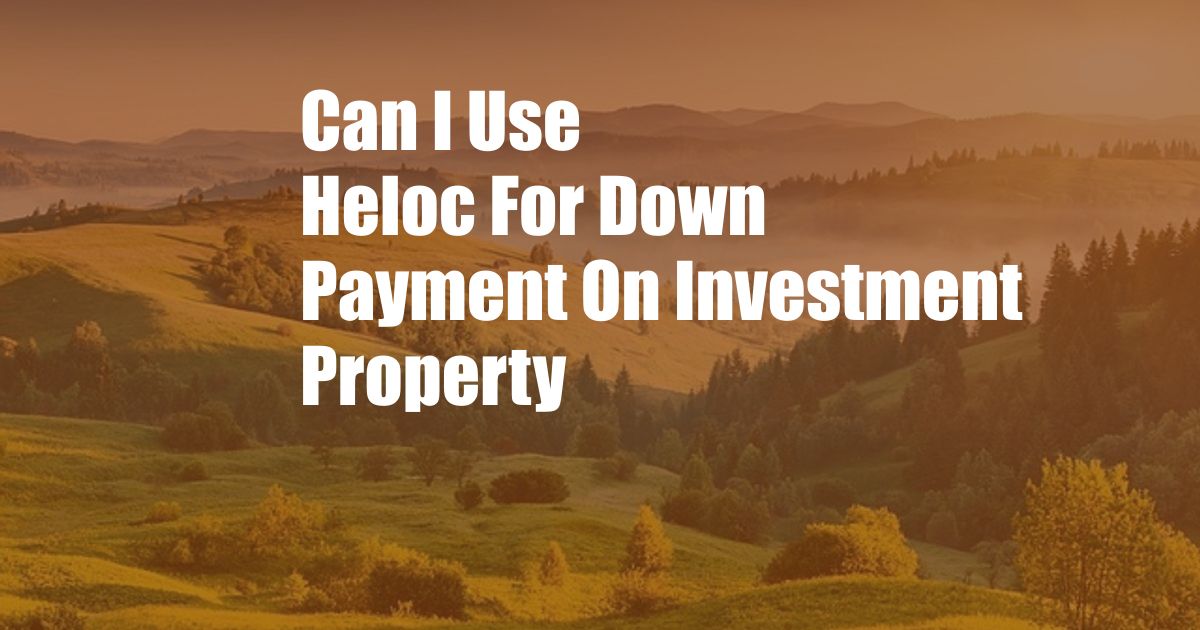
Can I Use a HELOC for a Down Payment on an Investment Property?
As a homeowner, you may have considered tapping into your home equity to finance a down payment on an investment property. Utilizing a home equity line of credit (HELOC) is one potential option to explore. In this article, we’ll delve into the details of using a HELOC for this purpose, providing you with a comprehensive understanding of its potential benefits and drawbacks.
HELOCs offer several advantages for homeowners. They provide access to funds without having to sell your home, offer flexible repayment terms, and may feature relatively low interest rates compared to other financing options. However, it’s crucial to weigh these benefits against potential risks before making a decision.
Understanding HELOCs
A HELOC is a revolving credit line secured by your home equity. It allows you to borrow funds up to a certain limit, similar to a credit card. You can access these funds through checks, ATM withdrawals, or online transfers. Repayments are typically made in monthly installments, with interest charged only on the amount borrowed.
HELOCs usually come with variable interest rates, which means they can fluctuate based on market conditions. This can impact your monthly payments and overall borrowing costs. It’s essential to factor in potential interest rate increases when determining if a HELOC is a suitable financing option for your situation.
Using a HELOC for an Investment Property Down Payment
While HELOCs can be used for various purposes, including home renovations, debt consolidation, and education expenses, using them for investment property down payments is a less common practice. Lenders generally view investment properties as riskier than primary residences, which may affect their willingness to approve a HELOC for this purpose.
If you’re considering using a HELOC for an investment property down payment, it’s crucial to research potential lenders and understand their specific requirements. Some lenders may limit the loan-to-value (LTV) ratio, which is the amount you can borrow against the value of your home. Additionally, they may require personal guarantees or additional collateral to mitigate risk.
Tips for Using a HELOC for an Investment Property Down Payment
- Explore Alternative Financing Options: Before committing to a HELOC, consider other financing options such as traditional mortgage loans or personal loans. These options may offer lower interest rates or more flexible terms.
- Calculate Your Costs: Determine the total cost of using a HELOC, including interest charges, closing fees, and other potential expenses. Ensure that the potential return on your investment property outweighs these costs.
- Consider the Risks: Using a HELOC for an investment property down payment conlleva risks. If the property value decreases or you encounter financial difficulties, you may struggle to repay the loan and risk losing your home.
Conclusion
Using a HELOC for an investment property down payment can be a viable option for some homeowners, but it’s essential to proceed with caution. Carefully consider the potential benefits and risks, compare it to alternative financing options, and consult with financial experts before making a decision. By taking these steps, you can make an informed choice that aligns with your financial goals and risk tolerance, helping you leverage your home equity for potential investment opportunities.
Are you interested in learning more about HELOCs and their potential uses for investment property down payments? Share your thoughts and questions in the comments below.